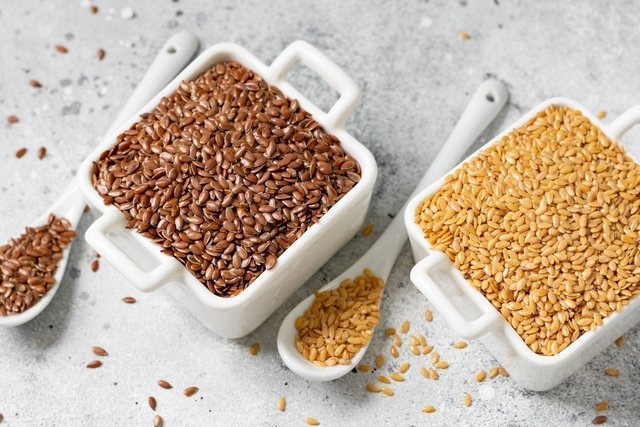Flaxseed is the flax seed, which is very rich in fiber and is used especially as a natural laxative, as it increases the volume of stool and promotes natural bowel movements, helping to prevent and combat constipation.
In addition, flaxseed also contains good amounts of omega 3, vitamin E and magnesium, nutrients with relaxing and anti-inflammatory properties, which improve the relaxation of blood vessels and reduce inflammation of the arteries, helping to prevent the emergence of diseases. , such as high blood pressure, atherosclerosis and heart attack.
Types of flaxseed include golden and brown, which have a light flavor and can be found in health food stores or supermarkets. These seeds can be added to rice, yogurt, juices, salads, and can also be used in preparations such as cakes, breads, pancakes and cookies.

Health benefits of flaxseed
Regular consumption of flaxseed provides several health benefits, such as:
1. Fight constipation
Because it is rich in insoluble fiber, a type of fiber that increases stool volume and promotes natural bowel movements, flaxseed facilitates the elimination of stool, helping to combat constipation. See other foods rich in insoluble fiber.
2. Maintain eye health
Flaxseed contains lutein and zeaxanthin, carotenoids with antioxidant action that protect the retina of the eyes against ultraviolet rays from the sun and blue light emitted by devices such as computers and cell phones, helping to maintain eye health and prevent emergence of situations such as cataracts and diabetic retinopathy.
3. Control glucose levels
Because it is rich in fiber, flaxseed slows down the absorption of sugar from food, helping to control blood glucose levels, thus preventing insulin resistance and diabetes.
Furthermore, flaxseed also has excellent amounts of omega 3 and omega 6, healthy fats with antioxidant and anti-inflammatory properties, improving the function of the hormone insulin and thus helping to control blood sugar levels in people who already have diabetes. Discover other foods with omega 3 and omega 6.
4. Lower cholesterol and triglycerides
Flaxseed is rich in fiber that reduces the absorption of fat from food in the intestine, in addition to reducing the production of cholesterol by the liver, reducing cholesterol and triglyceride levels in the blood.
5. Help with weight loss
Because it contains great amounts of fiber, flaxseed prolongs the feeling of satiety, helping to reduce food intake throughout the day and thus promoting weight loss. See other foods that also help with weight loss.
6. Avoid cardiovascular diseases
Flaxseed contains omega 3, selenium, omega 6 and vitamin E, nutrients with antioxidant and anti-inflammatory properties that improve artery health and prevent inflammation, helping to prevent the emergence of diseases such as high blood pressure, heart attack and atherosclerosis.
7. Prevent the emergence of cancer
The fiber present in flaxseeds serves as food for the good bacteria in the intestine, which reduce inflammation and fight bad bacteria, keeping the intestinal flora balanced and helping to prevent the appearance of cancer in the intestine.
Furthermore, flaxseed also contains good amounts of omega 3, omega 6, zeaxanthin and lutein, compounds with antioxidant properties that combat excess free radicals in the body, thus preventing the emergence and multiplication of cancer cells.
8. Prevent osteoporosis
Flaxseed contains good amounts of phosphorus, calcium and magnesium, minerals that participate in the formation and maintenance of bone health, helping to prevent osteoporosis.
Because it is rich in potassium, a mineral that helps neutralize excess acid, flaxseed also increases the body’s pH, reducing the elimination of calcium in the urine and thus preventing osteoporosis. Discover other foods that are sources of potassium.
9. Maintain brain health
Flaxseed has good amounts of omega 3, a type of healthy fat with antioxidant and anti-inflammatory action, which improves the functioning of neurons, maintaining brain health and helping to prevent memory loss and difficulty in logical reasoning. and the emergence of Alzheimer’s.
10. Combat anxiety and depression
Because it contains tryptophan, which is an amino acid responsible for producing serotonin, flaxseed helps increase happiness, improving mood and thus combating anxiety and depression. See how to include foods with tryptophan in your diet.
Flaxseed properties
Flaxseed has antioxidant, antidiabetic, anti-inflammatory, lipid-lowering, anticancer and anxiolytic properties.
This is because it is rich in fiber, omega-3, omega-6, lutein, zeaxanthin, selenium, vitamin E, phosphorus, calcium, magnesium and tryptophan, which give it all its health benefits.
Nutritional information table
The following table provides nutritional information for 100g, which is equivalent to approximately 10 tablespoons, of flaxseed.
It is important to remember that to obtain the benefits of flaxseed it is recommended to maintain a healthy and varied diet and practice physical activity regularly.
To find out how to consume flaxseed in a healthy diet, make an appointment with a nutritionist in the region closest to you:
Taking care of your health has never been easier!
How to consume
It is important to buy flaxseed in the form of flour or grind the seed at home, because the intestine cannot digest and absorb all the nutrients from the whole flaxseed grain. Furthermore, this seed must be stored in a container with a good seal and protected from light, to preserve the nutrients.
Flaxseed has a light flavor and can be added to rice, yogurts, juices, salads, and can also be used in preparations such as cakes, breads, pancakes and cookies.
The recommended amount to obtain the benefits of flaxseed is 1 tablespoon per day. However, it is not recommended to consume more than 4 tablespoons of this seed per day, as excessive fiber intake can cause constipation, diarrhea, gas or abdominal bloating.
Healthy recipes with flaxseed
Some healthy recipes with flaxseed are breads, cookies, pancakes and cakes.
1. Flaxseed bread
Ingredients:
- 2 ½ cups of whole wheat flour;
- 2 ½ cups of common wheat flour;
- 2 cups of rye flour tea;
- 1 cup of crushed flaxseed;
- 1 tablespoon of chemical yeast powder;
- 1 teaspoon of honey;
- 2 teaspoons of butter;
- 2 ½ cups of warm water;
- 2 teaspoons of salt;
- 1 egg for brushing.
Preparation mode:
Mix all the ingredients in a bowl and knead until the dough is homogeneous and smooth. Cover the dough with a cloth and let it rest for 30 minutes. Shape the loaves and place them in a greased pan, baking in a preheated oven at 180ºC for 40 minutes.
2. Banana pancake with flaxseed
Ingredients:
- 1 banana;
- 2 tablespoons of oats;
- 1 ovo;
- 1 teaspoon of crushed flaxseed;
- Cinnamon to taste;
- 1 strand of honey.
Preparation mode:
Mash the banana with a fork. Add the egg, oats, flaxseed and mix well with a spoon or spatula. Heat a non-stick frying pan over the fire and make the pancake, browning it on both sides. Transfer the pancake to a plate, sprinkle with cinnamon powder, add honey and serve.

Sign up for our newsletter and stay up to date with exclusive news
that can transform your routine!
Warning: Undefined array key "title" in /home/storelat/public_html/wp-content/plugins/link-whisper-premium/templates/frontend/related-posts.php on line 12
Warning: Undefined array key "title_tag" in /home/storelat/public_html/wp-content/plugins/link-whisper-premium/templates/frontend/related-posts.php on line 13



